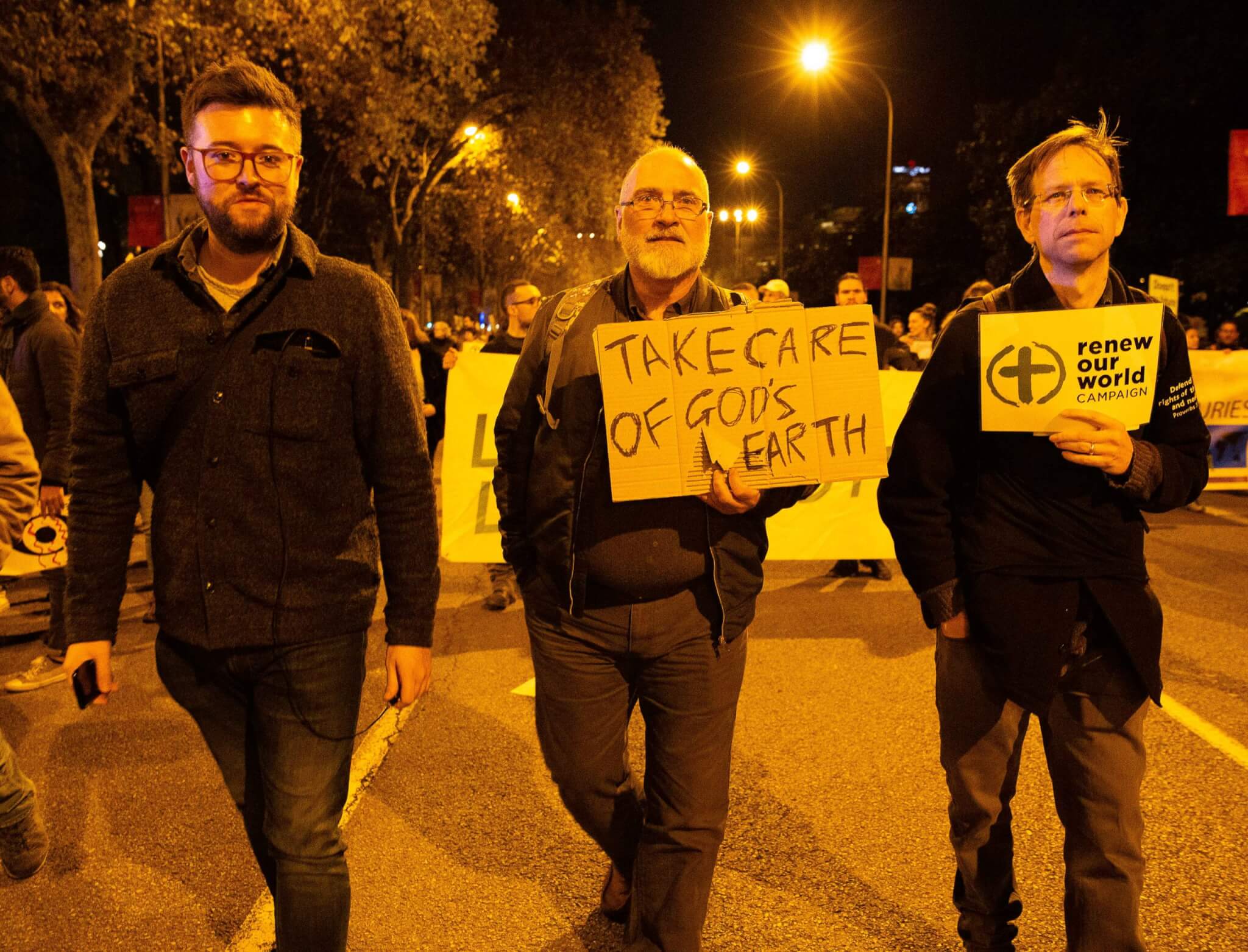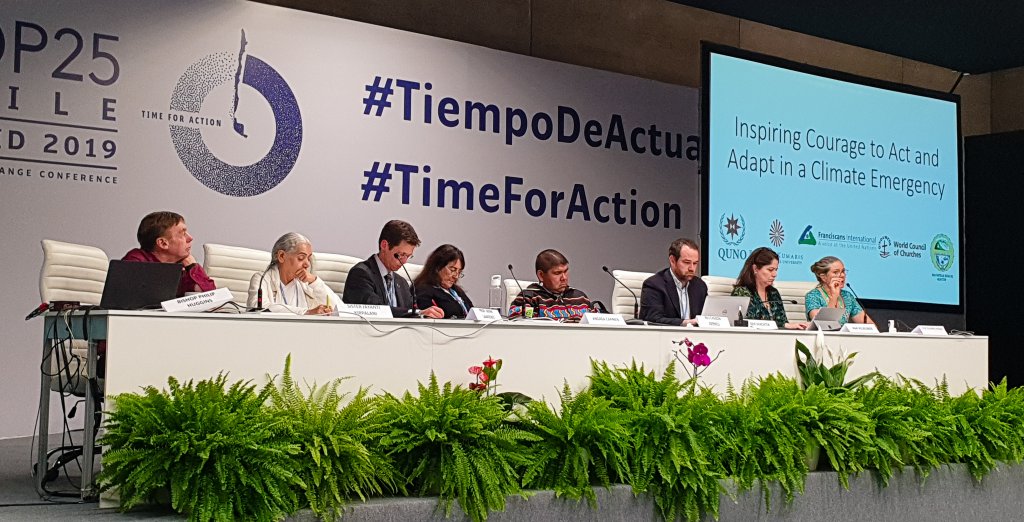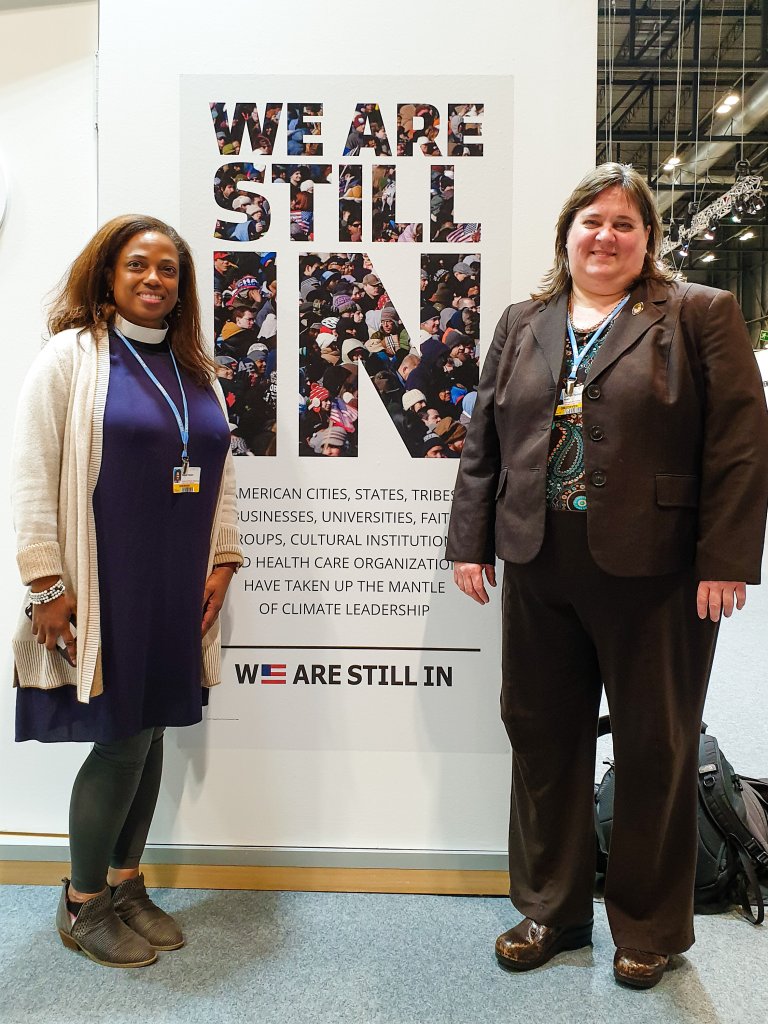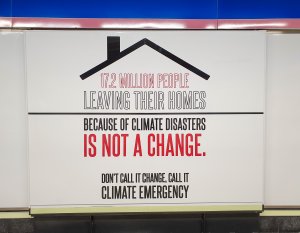“I call upon churches to create consciousness that there is a crisis which we are all part of… I call upon the churches to work in a united way. As faith-based organisations we can make a difference working together.
“This is God’s world. We play a very important role as stewards of this reality. God is still in the mix – we just have to get it right” – Archbishop Julio Murray, Bishop of Panama and Archbishop of Central America.
Across the Communion, Anglicans are on the front line of the climate emergency. They are not only affected by the impacts of climate change but are also taking action to respond to its challenges. This wealth of experience was in evidence at the 25th UNFCCC Conference of Parties (COP) climate talks which took place earlier this month in Madrid, Spain. Anglicans were among the faith-based voices speaking into the conference, others of which included the campaign Renew Our World, of which the Anglican Alliance is a member, the World Council of Churches, ACT Alliance and the Global Climate Catholic Movement.

Renew Our World call for climate justice both inside the COP and at the mass march in Madrid. Photo: Anglican Alliance / Elizabeth Perry.
Melanie Mullen from The Episcopal Church spoke of how welcome faith voices were at the COP, saying, “We continue to be surprised and encouraged as national delegations at COP look to faith bodies as the place civil society nurtures hope and progress”.
Here we share some of the Anglican voices that spoke into the COP.
The voice of a Communion Primate – The Archbishop of Central America
Archbishop Julio Murray, the Bishop of Panama and Primate of Central America, who provides leadership to the Anglican Communion on climate change was one of the Anglicans present at the COP. Speaking from his own context, he said, “The main impact of climate change in the Central American region has to do with drought and flooding; it has to do with farmers not being able to identify clearly when to harvest and when to plant. It is also having an effect on women and children, who are usually the most excluded people in society. It also has an effect on forced migration because if people can’t produce for their families, they are forced to move to seek places where they can be productive and have a future for their family”.
In the video, Archbishop Julio reflects on his experiences at the COP. He describes his impressions from his time there, saying: “What has impacted me most is the fact that climate change is a human rights issue. People are displaced, people living on islands – their islands are disappearing, people are suffering. And I can’t understand how some people are saying climate change is not a reality.”
Speaking of what had inspired him at the COP, Archbishop Julio reflected: “What has been so encouraging is seeing the participation of young people on the floor – involved, engaged, energised, seeking more ways to act together”.
At the conference Archbishop Julio also highlighted the importance of environmental justice within holistic Anglican mission: “The fifth Mark of Mission is about taking care of the planet or being good stewards of God’s creation. As the Anglican Communion we are also looking forward to making this part of the theme of the upcoming Lambeth Conference in 2020. We are here because we want to give testimony that there is time for us to act, and yes, we can make a difference.”
The voice of a young activist from Uganda
One of those young voices was 15 year old Leah Namugerwa, a climate activist from Uganda, who is also an Anglican. In this video interview, Leah describes how she is a team leader of Fridays for Future in Uganda and how she set up a project called ‘Birthday Trees’ for people wanting to celebrate their birthdays by planting trees and how she herself planted 200 trees on her 15th birthday this year. Leah has also started a petition to ban plastic bags in Uganda and spreads awareness of climate justice in schools.
In an impassioned plea to everyone in the Anglican Communion Leah said: “My message to Anglican churches is that it is not too late to join the struggle to save the planet. I want the Anglican church to raise this climate emergency through preaching every Sunday at services, letting people know what is going on in our world … to give us the climate justice we are looking for.”
Absent, but heard – actions by Tongan Anglican youth speak louder than words
One of the side events held at the COP was a panel discussion titled, “Inspiring Courage to Act and Adapt in a Climate Emergency”. The final speaker was Professor Elisabeth Holland, Professor of Climate Change at the University of the South Pacific who was a co-recipient of the 2007 Nobel Peace Prize for her contribution to the Intergovernmental Panel on Climate Change.

Professor Beth Holland (far right) and Bishop Philip Huggins (far left) on the “Inspiring Courage to Act and Adapt in a Climate Emergency” panel. Photo: Anglican Alliance / Elizabeth Perry.
After speaking from a scientific perspective, Professor Holland said, “I would like to tell you the story of what courage looks like in our youth in the Pacific”. She described the development of two toolkits by Pacific Island women, one on vulnerability in communities and the other on community mapping, which were shared with a group of young people from the Anglican Church in Tonga. A short time later, while on a trip to Ecuador, Professor Holland became aware that Tropical Cyclone Gita was brewing and provided cyclone forecast updates to the youth they had trained in the use of the toolkits.
“At first they were panicked”, Professor Holland reported. “They said ‘what do we do? We’re looking at a category 4 tropical cyclone heading towards us’”. But, encouraged by their parish priest that now was the time to put their training into action, the young people assembled disaster preparedness kits “and went to work, helping provide calm and support for their entire congregation”.
Professor Holland concluded, “And that’s what I think inspiring courage to act and adapt in a climate emergency begins to look like. It’s putting the science into action; it’s putting what we know into action”.
The voice of the US-based Episcopal Church

Melanie Mullen (left) and Lynnaia Main from TEC. Photo: Anglican Alliance / Elizabeth Perry.
Care of creation, which includes addressing the climate emergency and eco-justice, is one of the top three priorities of The Episcopal Church (TEC). TEC has participated in the UNFCCC Conference of Parties since COP 21 in 2015, urging negotiators and other stakeholders to ramp up their action. In their letter to country representatives negotiating at the COP this year, they wrote, “we ask that you remember the needs of those most vulnerable to the impacts of climate change – most of whom cannot come to COP25 – both at home and around the world. We think especially of those in frontline communities, developing countries, small island states, indigenous peoples, children and women. Their future, and that of our planet, depends upon the critical decisions you will make. We pray that your action on their behalf will be characterized by a spirit of love, wisdom and generosity”.
Speaking into specific policy areas, TEC urged Parties and all other stakeholders to prioritise: accelerating ambition; increasing support for loss and damage; protecting human rights and affirming climate justice in addressing adaptation and mitigation; and boosting financial resources and mechanisms.
Read more on TEC’s contribution to the COP here: At UN climate conference, episcopal delegation urges nations to act swiftly and justly.
A voice from Australia – Bishop Philip Huggins
Also at the COP was Bishop Philip Huggins, President of the National Council of Churches in Australia and an official delegate at the COP on behalf of the World Council of Churches. Bishop Philip organised a retreat for COP party delegates on the middle Sunday of the conference, providing a much-needed breathing space.
During the conference, Bishop Philip played a new music clip, “What the World Needs Now”, which brought a special message of hope from the students of Lowther Hall Anglican Grammar School.
Mia, one of the singers, said: “It is our hope that the delegates will come together to address the global climate issues in a compassionate and caring way and this song is our plea for constructive and co-operative leadership to guide us through these complex issues. As children of today and adults of the future our voices need to be heard and our concerns listened to.” Mia is a student at Lowther Hall and is Chair of the school’s Social Justice Committee.
Speaking at the Conference, Bishop Philip said: “In recent years I have been involved in two massive bush fires in Australia. People have died. And in the midst of it there is enormous courage and compassion shown by people. What we know is that in relation to the climate emergency the whole global family has to show that kind of compassion and that kind of courage”.
Absent Voices – Brazil
Anglicans from Brazil had been planning to attend the COP when it was in its intended location of Chile but were unable to travel to Spain when the COP was relocated there because of unrest in Chile. Writing ahead of the conference, Guilherme Gastal said: “We are witnessing an advance in a discourse of diminishing or denying the need to combat climate change… This denialist speech is extremely damaging to the discussion and has the potential to delay the urgent measures that must be taken to minimize the impacts that climate change will bring on humanity, especially the vulnerable population and the poorest countries. Given this, I feel even more motivated, as a professional in the area and activist of social and environmental causes, to spread the event in my community, to be present through this message and to be praying here in Rio Grande do Sul that there will be initiatives to maintain global warming below 1.5°C.”
Elisabeth Sherryl, an ecological and environmental professional from Brazil, also spoke ahead of the COP, saying she was hoping “that governments commit to the 1.5°C level of rise in temperature, and not the previous 2°C, now admittedly not sufficient; that concrete plans are presented with legally binding objectives, goals and timelines regarding energy efficiency and emissions of CO2. Most importantly, I hope that the world’s greatest emitters, China and the USA, present and abide by such goals and timelines. Although politically this seems far-fetched, especially with the USA’s present administration, I hope that enlightened and faithful people in these countries will work for this to happen, despite their present leadership.
Where now?

Photo: Anglican Alliance / Elizabeth Perry.
Despite the impassioned calls of many both inside and outside the conference, the COP ended in disappointment. This makes 2020 an even more critical year for the world to take action on climate change. Two key opportunities for Anglican engagement are the Lambeth Conference in July and next year’s COP.
The Archbishop of Canterbury Justin Welby has written: “Climate Change is the greatest challenge that we and future generations face. When we look at Jesus, we see one who instinctively stood alongside the most vulnerable in society. It is absolutely clear that following Jesus must include standing alongside those that are on the frontline of this unfolding catastrophe. Climate change will rightly be a central part of our reflections and conversations at next year’s Lambeth Conference”.
The year 2020 will culminate in COP26, which will be held in Glasgow, in the UK. This fifth anniversary of the historic Paris climate agreement is a scheduled milestone for all nations to significantly increase their ambition for reducing greenhouse gas emissions. If countries fail to take the necessary steps, the integrity of creation is likely to break down.
Why does the Anglican Alliance care about climate change?

Photo: Anglican Alliance / Elizabeth Perry.
The Anglican Alliance connects, equips and inspires the worldwide Anglican family to work for a world free of poverty and injustice and to safeguard creation. Climate change is a major factor driving poverty and migration, as well as having severe detrimental impacts on the environment. The Anglican Alliance works closely with the Anglican Communion Environment Network, the group of committed Eco-Bishops, the Green Anglicans movement as well as church provinces and agencies actively engaged in promoting environmental justice – in living out the fifth Mark of Mission to protect the integrity of creation and renew the life of the earth. We also connect with ecumenical climate initiatives, such as Renew our World.
The Anglican Alliance also provides a convening platform for Anglican churches and agencies to work together in the aftermath of disasters, many of which are climate related. Helping build resilience to disasters and building partnerships for response and resilience is an increasingly important part of our work. See here. Please also see our prayer and worship section and our Season of Creation post. Our report of the Lambeth roundtable on climate change and migration is a rich source of stories and information.
